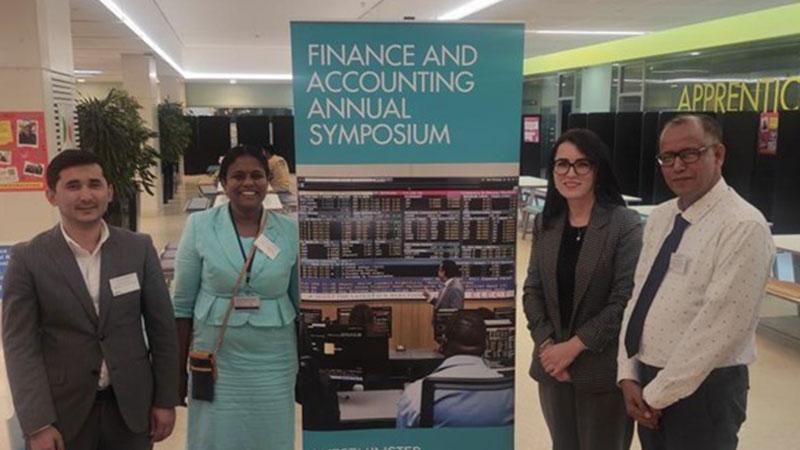The School of Finance and Accounting (SFA) at the University of Westminster hosted its fourth Finance and Accounting Annual Research Symposium between 17 and 18 June. This year’s event explored the theme of Central Bank Digital Currencies (CBDCs), their implications and how they can contribute to sustainable development.

Central Bank Digital Currencies (CBDCs) are a relatively recent and complex topic in the dynamic economic environment. CBDCs refer to a country’s central bank that can issue digital money rather than physical money. The introduction of CBDCs globally has heralded a significant change in how money matters will be managed in a country and is hoped to promote financial inclusion and contribute to sustainable development across the globe.
The symposium comprised 14 sessions with just as many session chairs and 45 presenters. The event benefited from two distinguished keynote speakers. The academic keynote speaker was Professor Raj Rajarajan, Director at the Multidisciplinary Centre of Cyber Security for Society (MOBS), City, University of London. The industry keynote speaker was Matthew Hunt, Strategic Adviser, Payments. Hunt was a member of the Bank of England CBDC engagement forum, which advised the Bank and HMT on the forthcoming CBDC consultation
The symposium examined a wide range of key finance, data analytics and accounting topics, ranging from digital currencies and assets, asset pricing, corporate finance, financial econometrics, forecasting, fund management, market sentiment, sustainable development, thematic investing, financial reporting, accounting standards, taxation to big data and data analytics.
The international symposium received 66 submissions from Belgium, China, Denmark, Finland, France, Germany, Ghana, Hong Kong, Hungary, India, Iran, Malaysia, Netherlands, Norway, Nigeria, Spain, Singapore, Switzerland, Turkey, the USA, the UK and Uzbekistan.
Policymakers and society are grappling with important questions about the operational implementation of CBDCs, the relationship between CBDCs and the money backed by a country's government, as well as technological and regulatory opportunities and challenges around them.
Dr Sheeja Sivaprasad said: “On behalf of the symposium co-chairs, Dr Jing Ning and Dr Yang Yue, I would like to thank all the participants at the symposium. It was a successful event on a topic currently on every country's agenda, as CBDCs are envisaged to promote financial inclusion and contribute to the UN SDGs.
“Should a country introduce a digital banknote at all? The two key aspects that a country needs to pay attention to before its implementation are the implications on the financial stability of a country and the country's cyber security infrastructure to support its implementation.”
Find out more about Finance and Accounting courses at the University of Westminster.






